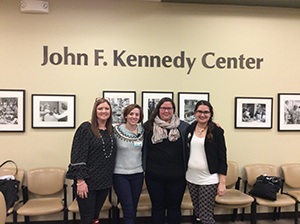Vanderbilt Consortium LEND
March 12, 2018

|
The Vanderbilt Consortium LEND program has provided far reaching opportunities for trainees to gain expertise in family-centered care, to become familiar with community resources, and to develop an interprofessional problem solving mindset. In addition to providing rigorous leadership training and an intensive 24-week core series on topics ranging from life course to ethics, from specific diagnoses to medical home, from newborn screening to policy, the core curriculum and leadership seminars have reinforced the importance of interprofessional and family-centered care within the healthcare setting. These learning experiences have aided our understanding of our role as part of a healthcare team and have helped expand our knowledge of the roles of other professionals we work alongside.
In an effort to provide hands-on experience as we try to understand the complexities of the healthcare system, our program arranged for its trainees to take part in a care navigation experience. After being paired with a family, our trainees followed up with parents to inquire about questions or barriers they were experiencing in regards to follow-up recommendations. Marcos Colon, a developmental pediatrics fellow described his experience in this differing role as follows, "It was extremely satisfying and fulfilling to help out this young family and their child obtain the services they needed, because how to obtain the services was not as easy as I once thought. I am often the one giving out those recommendations, with little knowledge of what happens between our visits other than the family's word of mouth. They typically tell me the frustrations and hardships they have gone through to establish follow-ups and evaluations. To see the process unfold and be a part of it was enlightening, to say the least. It was also nice to just talk to real people with real problems in an unofficial capacity from my usual line of work. It was interesting to hear the mother talk about issues she usually wouldn't divulge in the examination room and to relate to the experiences." By helping families navigate through the healthcare system, trainees were able to get a better appreciation for some of the struggles families may go through to obtain the surfaces they need.
Trainees have also had various opportunities to visit community agencies to develop an understanding of resources available to parents and children within the community. In October, a few trainees visited the Regional Intervention Program in Nashville. This program is designed to teach effective parenting strategies to improve a child's behavior and is offered free of charge. Another community agency trainees were able to visit was the Family Resource Center located in the Vanderbilt Children's Hospital. This center provides educational and resource information to families in order to help them better understand their child's health condition and learn about available resources in their area.
Another activity that has aided in trainees' understanding of neurodevelopmental disorders and interprofessional care is observing in a clinic with a healthcare professional in an area of expertise different than their area of study. Observing a profession I was unfamiliar with helped me further understand the role of a neurodevelopmental pediatrician and allowed me to encounter children with disorders I was unfamiliar with. It also allowed me to gain experience seeing typical versus atypical development.
Overall the Vanderbilt Consortium LEND program has been involved in various opportunities throughout the community and with other healthcare professionals that has helped cultivate an understanding of interprofessional collaboration for its trainees. Through leadership training, exploring community resources and building lasting professional relationships, this program is empowering trainees with the resources necessary to make a lasting impact on patients and healthcare in the future.







